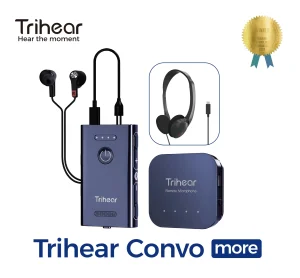

At Hears to U, we stay informed about the latest research and insights shared by experts in the field of hearing healthcare. This blog post is a summary of information published in Frontiers in Audiology and Otology, dated March 11, 2024, focusing on the advancements in technology and innovation within hearing aids. The article, authored by King Chung and Fan-Gang Zeng, delves into the exciting developments shaping the future of hearing devices and OTC hearing aid reviews. If you would like to read the full article let us know and we can send you a copy.
Around 1.6 billion people, which is about 20% of the world’s population, have some level of hearing loss. This number is expected to rise to around 2.5 billion by the year 2050. Hearing loss is a significant cause of disability globally, costing the world about US $1 trillion annually due to healthcare, education, lost wages, and reduced quality of life. Hearing aids, which have been around for over a century, help people with hearing loss.
However, not many people use them because they can be expensive and hard to access. To make hearing aids more available, the FDA introduced over-the-counter (OTC) hearing aids for adults with mild-to-moderate hearing loss in October of 2022. These OTC hearing aids amplify soft sounds and have volume controls but are different from other hearing aids as they don’t need a prescription. They must meet certain safety requirements and come with warning signs to seek professional help if needed. People see OTC hearing aids as a significant step in making hearing aids more accessible and, hopefully, affordable, potentially changing how hearing care is provided globally.
Since the FDA introduced over-the-counter (OTC) hearing aids a year ago, there have been some interesting changes in the market. Over 100 companies are now making OTC hearing aids, with most of them being startups from Asia. Some big companies, known for making regular hearing aids, are also entering the OTC market. Companies such as Sonova, Demant, Sivantos/Widex (WSA), GN ReSound, and Starkey. However, notable companies like Google and Apple haven’t joined the OTC market yet, even though they have the technology to make high-quality hearing aids.
On the demand side, people using OTC hearing aids are generally younger and have had hearing loss for a shorter time compared to those using prescription hearing aids. However, the overall number of people using OTC hearing aids is still low. One reason could be the price. While a good pair of OTC hearing aids can cost between $800 and $3,000, most people are only willing to pay around $200 for them. Apple’s AirPods, priced similarly, have been very successful, selling over 80 million units in 2022 alone.
The FDA set rules for over-the-counter (OTC) hearing aids, including limits on maximum output levels without restricting gain. This means the hearing aids can amplify sounds more than needed for mild-to-moderate hearing loss. Analyses showed that these OTC devices can actually provide enough amplification for severe or profound hearing loss. While this might help more people, it also poses risks of overamplification. So, while OTC hearing aids offer potential for a wide range of users, both manufacturers and users need to be careful about excessive amplification.
To increase the popularity of OTC hearing aids, both technical improvements and changes in the business model might require consideration. If the price doesn’t go up, big companies might not be interested in joining the market. So, the OTC hearing aid market still has some challenges to overcome to make a bigger impact.
People worldwide widely use smartphones, which possess powerful computing capabilities. They also have similar output levels to OTC hearing aids. However, combining different earbuds and smartphones can create unpredictable results in terms of sound quality. Researchers have found a way to use smartphones with earbuds to create a personalized hearing aid-like system. By measuring a person’s hearing range with their specific earbud-smartphone combination, an app can adjust the sound to fit their needs. This technology could make smartphones a helpful tool for people with different levels of hearing loss.
True Wireless Stereo (TWS) earbuds are popular because they use radio waves to transmit audio without wires. They’re used for high-quality sound, noise cancellation, and even health monitoring. The TWS earbud market was worth $51 billion in 2022 and is expected to grow even more by 2030. Some companies, like Apple, are adding features to TWS earbuds that could work like hearing aids. However, the high price might stop these companies from making them OTC hearing aids.
TWS technology can improve OTC hearing aids in a few ways. First, noise reduction algorithms can make it easier to hear in noisy places. Second, the wireless connection between microphones and earbuds can improve sound quality and speech understanding. Finally, advancements in Bluetooth technology, like the LC3plus protocol, reduce delays, making TWS earbuds better for people with hearing loss. Overall, TWS technology could make OTC hearing aids even better in the future.
Artificial Intelligence is changing many areas, including healthcare. The FDA has approved over 170 AI-enabled medical devices. Smart hearing aids with AI features have been introduced since 2018. AI can be used in Over-The-Counter (OTC) hearing aids to analyze sounds, reduce background noise, and even improve speech understanding in noisy places, like at parties. This could greatly help people with mild-to-moderate hearing loss. AI technology is advancing quickly, and it’s likely that manufacturers will use it more in OTC hearing aids in the future.
The Over-The-Counter hearing aids, introduced by the FDA in the USA, have the potential to impact global hearing care in significant ways. They could make hearing aids more affordable, encouraging more people to try them, especially those who are younger and have recently noticed hearing difficulties. Currently, OTC hearing aids are expensive, but a future reduction in price could make them accessible to more people worldwide, including those in low-income countries.
Accessibility is crucial, as many people face barriers like multiple appointments and time away from work when seeking hearing aids. OTC hearing aids could remove these barriers by allowing direct access to those with mild-to-moderate hearing loss. This could expand the market for hearing aids rather than competing with traditional ones. Tele-audiology and artificial intelligence could also help, particularly in areas with limited healthcare infrastructure.
Stigma and lack of awareness are also barriers to hearing aid use. However, OTC hearing aids, which offer discretion and compatibility with smartphones and wireless earbuds, may reduce stigma and raise awareness about hearing loss. Overall, OTC hearing aids have the potential to improve global access to hearing care and reduce the negative impact of hearing loss on individuals and communities.
About 40% of dementia risk can be changed, with midlife hearing loss being a major factor. Studies suggest that using hearing aids can help slow down cognitive decline and reduce dementia risk, especially in people at high risk. While it’s not clear if hearing loss directly causes dementia, catching and treating hearing loss early could improve hearing, thinking abilities, and social connections, possibly preventing dementia in older age.
Over-the-counter (OTC) hearing aids target younger people with mild-to-moderate hearing loss. Helping them hear better early on may lead to greater long-term benefits, including improved cognitive health. This could be one of the most important impacts of OTC hearing aids.
The Over-The-Counter (OTC) hearing aid category was established in 2022 for adults aged 18 or older with mild-to-moderate hearing loss. Here are the key findings:
Thank you for reading and again if you have any questions please reach out for a copy of this article. As you know we offer many solutions including choices of the OTC hearing aids. We support new businesses that are entering into the field.
Cheers,
Powered By SinglerDesign.com